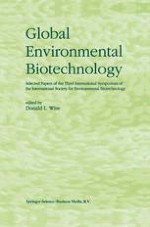1997 | OriginalPaper | Buchkapitel
Anaerobic degradation and production of alkane/alkene by a new facultative chemoautotrophic bacterium strain HD-1
verfasst von : Tadayuki Imanaka, Masaaki Morikawa
Erschienen in: Global Environmental Biotechnology
Verlag: Springer Netherlands
Enthalten in: Professional Book Archive
Aktivieren Sie unsere intelligente Suche, um passende Fachinhalte oder Patente zu finden.
Wählen Sie Textabschnitte aus um mit Künstlicher Intelligenz passenden Patente zu finden. powered by
Markieren Sie Textabschnitte, um KI-gestützt weitere passende Inhalte zu finden. powered by
Green plants, algae and cyanobacteria are the primary producers on earth which reduce annually about 1.3 × 1017 g of carbon as carbon dioxide to form organic matter. This enormous photosynthetic activity is counteracted by degradative processes, including consumption by animals and final mineralisation by lower fungi and bacteria and, to some degree, by the plants themselves. The degradation of organic matter ends primarily with CO2, H2S and NH3 as products, and thus recycles the mineral substrates necessary for photosynthesis. However, photosynthesis and degradation do not operate at exactly the same annual rates. Vast amounts of biogenic reduced carbon compounds (about 6 × 1021 g) are buried in sediments, rocks, coal, peat, oil and natural gas, whereas the standing crop of living plants (about 99% of total biomass) amounts to only about 7.4 × 1017g of bound organic carbon. The resources of bio-genetically reduced fossil carbon in the earth’s crust correlated to total reserve of photosynthetically produced molecular oxygen of 2.8 × 1022g in the earth’s atmosphere and ocean waters. This amount of molecular oxygen ensures anaerobic degradation for the overwhelming proportion of the organic matter produced annually. Anaerobic degradation processes are restricted to a few niches, such as sediments and isolated water bodies of lakes and oceans, and the gastrointestinal tracts of animals. Nevertheless, anaerobic degradation processes are of basic interest for an understanding of the cycling of organic matter in nature and the various processes and organisms involved. Although the importance of understanding anaerobic produces in our environment increases, our knowledge of this matter is scarce compared to that which accumulated on aerobic metabolism during the past century.
